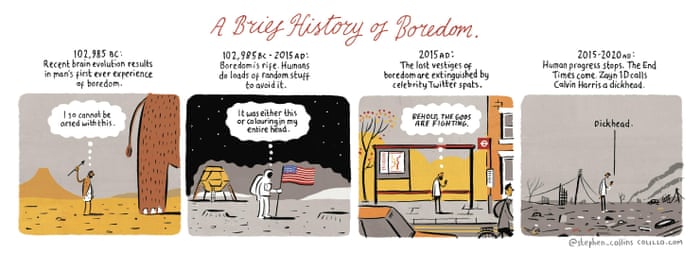Bored?
"You just want to poke your eyes out [from boredom]. Boredom is a very complex, multifaceted experience."
"People who say they experience a lot of boredom also say they struggle with x, y and z. And yet we know so little about it. That really fascinated me."
"I was interested in trying to understand; is boredom different from depression, or is it really, when it gets severe, just another name for depression? How does it overlap, or how is it distinct from feeling that life is not meaningful?"
"They're not the same thing [depression and boredom]. But they're closely related and understanding exactly how they're related is an interesting and unresolved question."
John Eastwood, professor of psychology, York University, Toronto
"[Boredom itself is] actually quite functional. It reminds [people], very strongly, that the behaviour they're currently engaging in is purposeless."
"[Boredom defined or accompanied by a feeling of purposelessness may prod people to find meaning] But it doesn't have to have constructive consequences."
Wijnand van Tilburg, lecturer in psychology, King's College, London
 |
| The Stephen Collins cartoon |
There are some real brain-teasers for researchers looking into boredom, its connections and its effects. The question arises, why is it that teens are more prone to boredom than adults? Psychosocial -- their emotional investment in altering circumstances they come across in life; their rejection of societal norms as social nuisances, their frustration at recognizing they haven't the means to make the changes they would like to achieve? Or could it be neurological in origin since the brain's frontal lobes where impulse control is lodged are the last to develop?
At the University of Waterloo, cognitive neuroscience professor James Danckert investigates the intriguing notion whether people who select a disorganized approach through cherry-picking digital games are more prone to boredom than their peers. Dr. Danckert studies the option of the self-regulating "fit"; that boredom occurs when someone has a goal but chooses to approach the goal through an inappropriate plan of action. Balancing that against the idea that they become distracted and cannot work up the interest to find a solution -- or any number of other false starts for any reason.
Boredom is a feeling of discomfort, one that leads us to take steps to somehow ameliorate that feeling. Both Drs. Danckert and Eastwood shy away from the conclusion that boredom represents a pathological mental state. Some sought-after solutions to defray boredom are recognized as counterproductive; those that come to mind are binge-eating or fixating on some online games or becoming glued to streaming Netflix.
Dr. Van Tilburg brought himself to the study of boredom through his interest in the manner in which people are able to create meaning and purpose to their lives. And many people find the solution to staving off boredom in the company of others, or in dedicating themselves to pasttimes that other people become invested in; a common purpose. That common purpose speaks to their social identities of belonging, through clubs, teams or campaigns, for example.

The sense of purposeless that most often accompanies boredom leads people to a search for meaning. Educators have expressed interest in whether boredom has the ultimate effect of affecting learning in a negative manner. Psychologists are now looking more closely at common processes of thought once seldom studied, such as nostalgia, daydreaming and mind-wandering. None of them particularly boring, and as examples perhaps some manner of wrenching the mind away from boredom.
And although scientists are now directing their attention to the issue of boredom and its effect on people's lives, it is a difficult concept to measure. A definition that everyone can agree on still eludes. Most researchers, however, agree that boredom represents a combination of attitudes or desires; wanting to engage, and failing to do so.
In interviews with people experiencing chronic depression, Dr. Eastwood and his colleagues, looking into this new field of research which "over the past 15 years we've come to realize there's something that deserves a closer look" have found through anecdotal evidence that boredom can trigger depressive thoughts, although the intersection and inter-relation of boredom and depression is not yet quite understood.
Labels: Bioscience, Health, Human Relations, Research

0 Comments:
Post a Comment
<< Home